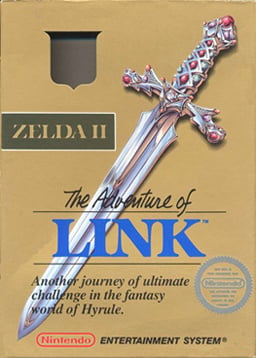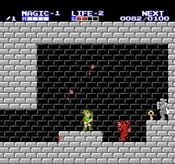Zelda II: The Adventure of Link: Difference between revisions
No edit summary |
m (Text replacement - "class=("?)invert\b([^-])" to "class=$1invert-dark$2") |
||
| (17 intermediate revisions by 11 users not shown) | |||
| Line 1: | Line 1: | ||
{{ | {{Title|''Zelda II: The Adventure of Link''}} | ||
{{ArticleIcons|allgames=y}} | |||
{{Infobox Game | {{Infobox Game | ||
|title = Zelda II: The Adventure of Link | |title = Zelda II: The Adventure of Link | ||
|image = [[File:Zelda_II_The_Adventure_of_Link_box.jpg]] | |image = [[File:Zelda_II_The_Adventure_of_Link_box.jpg]] | ||
|caption = [[File:ZeldaSymbol.svg|50px]] | |caption = [[File:ZeldaSymbol.svg|50px|class=invert-dark]] | ||
|developer = Nintendo EAD | |developer = Nintendo EAD | ||
|publisher = Nintendo | |publisher = Nintendo | ||
|designer = Tadashi Sugiyama (director)<br> | |designer = Tadashi Sugiyama (director)<br>Yasuhisa Yamamura (director)<br>Shigeru Miyamoto (producer)<br>Akito Nakatsuka (sound composer) | ||
|released = {{Flag|Japan}} January 14, 1987<br>{{Flag| | |released = {{Flag|Japan}} January 14, 1987<br>{{Flag|EU}} September 26, 1988<br>{{Flag|USA}} December 1, 1988 | ||
|platform = Famicom<br>NES<br>Game Boy Advance<br>Nintendo Wii (Virtual console)<br>Nintendo 3DS (Virtual console)<br>Nintendo Wii U (Virtual console) | |platform = Famicom<br>NES<br>Game Boy Advance<br>Nintendo Wii (Virtual console)<br>Nintendo 3DS (Virtual console)<br>Nintendo Wii U (Virtual console) | ||
|interwiki = zeldawiki | |interwiki = zeldawiki | ||
| Line 13: | Line 14: | ||
|interwikipage = Zelda II: The Adventure of Link | |interwikipage = Zelda II: The Adventure of Link | ||
}} | }} | ||
'''''Zelda II: The Adventure of Link''''' ({{ja|THE LEGEND OF ZELDA 2 リンクの冒険|The Legend of Zelda 2 Rinku no Bōken}}, ''The Legend of Zelda 2: The Adventure of Link'') is | '''''Zelda II: The Adventure of Link''''' ({{ja|THE LEGEND OF ZELDA 2 リンクの冒険|The Legend of Zelda 2 Rinku no Bōken}}, ''The Legend of Zelda 2: The Adventure of Link'') is a direct sequel to ''[[The Legend of Zelda]]'', both originally released on the Famicom Disk System in Japan and then the Nintendo Entertainment System in the US and PAL territories. While retaining many of the features of its predecessor, ''The Adventure of Link'' altered certain elements of gameplay, most notably affecting movement and combat. Traveling across a large world map (not unlike those seen in the ''Final Fantasy'' series of video games) would lead to enemy encounters which took place on a side-scrolling field of play rather than the top down perspective for which the series became known. | ||
''Zelda II: The Adventure of Link'' is available as a [[Masterpiece]] in {{forwiiu}}. | |||
==In the ''{{b|Super Smash Bros.|series}}'' series== | ==In the ''{{b|Super Smash Bros.|series}}'' series== | ||
[[File:Zelda2Origin.jpg|thumb|left|175px|Gameplay of ''Zelda II: The Adventure of Link''.]] | [[File:Zelda2Origin.jpg|thumb|left|175px|Gameplay of ''Zelda II: The Adventure of Link''.]] | ||
The | ===Moves=== | ||
[[Link]]'s up and down aerials are based on the upward and downward thrust, attacks that Link can use in this game. | |||
===Stage=== | |||
The [[Temple]] stage draws heavy inspiration from this game. | |||
===Music=== | |||
The songs "Temple" and "Great Temple / Temple" come from this game. | |||
===Misc.=== | |||
In ''[[Super Smash Bros. Brawl]]'', ''[[Super Smash Bros. 4]]'', and ''[[Super Smash Bros. Ultimate]]'', Link's black costume is inspired by the character [[Dark Link]], a character who debuted in this game. | |||
{{SSB4Masterpieces}} | {{SSB4Masterpieces}} | ||
{{Zelda universe}} | |||
[[Category:Games]] | [[Category:Games]] | ||
[[Category:The Legend of Zelda universe]] | [[Category:The Legend of Zelda universe]] | ||
Latest revision as of 13:29, May 20, 2024
| Zelda II: The Adventure of Link | |
|---|---|
 
| |
| Developer(s) | Nintendo EAD |
| Publisher(s) | Nintendo |
| Designer(s) | Tadashi Sugiyama (director) Yasuhisa Yamamura (director) Shigeru Miyamoto (producer) Akito Nakatsuka (sound composer) |
| Released | |
| Platform(s) | Famicom NES Game Boy Advance Nintendo Wii (Virtual console) Nintendo 3DS (Virtual console) Nintendo Wii U (Virtual console) |
| Article on Zelda Wiki | Zelda II: The Adventure of Link |
Zelda II: The Adventure of Link (THE LEGEND OF ZELDA 2 リンクの冒険, The Legend of Zelda 2: The Adventure of Link) is a direct sequel to The Legend of Zelda, both originally released on the Famicom Disk System in Japan and then the Nintendo Entertainment System in the US and PAL territories. While retaining many of the features of its predecessor, The Adventure of Link altered certain elements of gameplay, most notably affecting movement and combat. Traveling across a large world map (not unlike those seen in the Final Fantasy series of video games) would lead to enemy encounters which took place on a side-scrolling field of play rather than the top down perspective for which the series became known.
Zelda II: The Adventure of Link is available as a Masterpiece in Super Smash Bros. for Wii U.
In the Super Smash Bros. series[edit]
Moves[edit]
Link's up and down aerials are based on the upward and downward thrust, attacks that Link can use in this game.
Stage[edit]
The Temple stage draws heavy inspiration from this game.
Music[edit]
The songs "Temple" and "Great Temple / Temple" come from this game.
Misc.[edit]
In Super Smash Bros. Brawl, Super Smash Bros. 4, and Super Smash Bros. Ultimate, Link's black costume is inspired by the character Dark Link, a character who debuted in this game.
| Masterpieces in Super Smash Bros. for Wii U | |
|---|---|
| Starter games | Balloon Fight · Donkey Kong · F-Zero · Kid Icarus · Kirby Super Star · Kirby's Dream Land · Mega Man 2 · Metroid · Pac-Man · Pilotwings · Super Mario Bros. · Super Mario Bros.: The Lost Levels · Super Mario Kart · Super Mario World · Super Metroid · The Legend of Zelda · Wrecking Crew · Zelda II: The Adventure of Link |
| Unlockable games | Dr. Mario · EarthBound · Kirby's Adventure · Punch-Out!! Featuring Mr. Dream · Yoshi |
| Japan-only games | Fire Emblem: Shadow Dragon and the Blade of Light |
